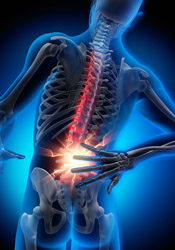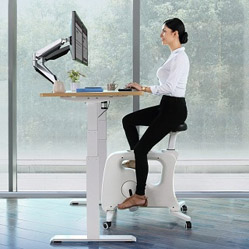Gateway to the Best Science News Sources
Our editors' picks for the top 3 news sources in each category:
|
|
Lower Back Pain: You Are the Best Remedy
It can happen with the same violence whether you're lifting a hefty flower pot or picking up from the carpet a measly leaf that fell from it. The stabbing pain turns, in a flash, your otherwise functional, middle-aged body into the locked-up, twisted framework of a late-life retirement home dweller. You just signed up for several days-if not weeks-of awful physical disability. You have joined the 80% of the population that will suffer from a severe episode of lower back pain at least once in their lifetime, and you are one of the 25% of U.S. adults who will report lower back pain this quarter alone[1]. Unless you are one of the lucky few affected with a light version of the condition- in which the pain will fade away after a few hours of rest and a good night sleep-chances are that you will not be heading to work tomorrow morning. Lower back pain causes more disability around the world than any other condition[2] and is a leading cause of missed work, costing businesses billions of dollars every year. After a few brave attempts at reversing the sudden condition with a few magic yoga moves snatched from YouTube, you are now lying on the sofa, defeated, in what feels like the least painful position. Each passing car of a carefree commuter drills further into your brain the realization that you have been sidelined from life. You feel as abandoned as the flu-stricken kid you once were, who stared at the ceiling of his bedroom while imagining his buddies chasing one another in the school playground. Lower back pain's sidekick: depression
If this is your first lower back pain attack, you are about to discover the most uncanny, disturbing symptom of the condition: depression. It does not stem from the pain itself-by now, you might have found a way to tame it a bit with anti-inflammatory drugs, a heat pad, or simply a good resting position. The massive blues that smothers you stems from the realization that the moment you try to inch back towards a normal life-for instance by standing up with the intent of fixing yourself a cup of tea-the shooting pain will throw you back down without mercy. Just yesterday, you were flying from task to task at the office, running to catch your bus, and chasing squirrels off your prized garden. Today, you have been pinned to the wall like a butterfly. No more flying, no more running, no more chasing. You are immobilized so badly that you cannot even imagine performing these lively activities again in the foreseeable future. Few ailments can induce such feelings of helplessness, dependence, and end-of-normal life as lower back pain does. It feels as if your happiness nerve itself had been irreversibly severed by the injury. On the compassion front: minimum serviceYou are now drowning in a cocktail of debilitating pain and depression, but you will not receive the sympathy to which you should be entitled. Do not even think about heading for the emergency room. The staff there will scold you with the argument that back pain is not even close to being a life-threatening condition and should be routed to a primary care physician. Of course, your partner and kids will feel bad for you, and so will your coworkers when they learn of your plight, but two factors will conspire to rob you of the compassion you deserve. First, lower back pain is very common and almost always reversible, and pretty much everyone is aware of these facts. In addition, you are so restricted in your movements and so ridiculously distorted when you manage to stand up that even the most caring persons around you cannot help but wonder whether you might be a bit of an overreacting wimp. No one can understand the handicap and distress caused by a serious spell of lower back pain unless they have experienced it themselves. This limited empathy leads to a further sentiment of isolation and of having been cast off from the world of the living. On the medical care front: a shortage of real solutions
Lower back pain: Day 2. The painful awakenings during the night as a result of unconsciously changing positions left little room for hope. The morning has finally arrived and you have to face it: The problem has not gone away; if anything, you feel worse than ever. Your partner has to help you put on your clothes; the embarrassment combines with the pain to aggravate you. The cab driver brakes too hard at the stop lights and the resulting jerks throw you in a tailspin of pain. Having to contort on a chair of the doctor's waiting room for half an hour in an effort to find a bearable position finishes to put you on edge. Your family doctor greets you with a smile that fades away as soon as you describe your problem. Few medical issues are as tough to diagnose as lower back pain and the "non-specific" (i.e.; unknown) causes of that condition still unnerve many doctors. Among the front runners as culprits for a sudden bout of back pain are a herniated disk, a pinched nerve, or a flare of sciatica. All elusive conditions that do not usually warrant surgical intervention, or a real therapeutic treatment. The first line of defense consists of a combination of over-the-counter anti-inflammatory drugs and a few costly sessions of physical therapy. If your pain is unbearable, you might get an intravenous injection of an anti-inflammatory agent or a prescription for an opioid medication. These harsher treatments only address pain, not its root cause. In addition, back pain has become one of the leading entry points to opioid addiction, a major healthcare crisis in the U.S. Where does all this leave you? More in control than you would think.If the points listed above have you running for anti-depressants, please wait, there is light at the end of this tunnel! When it comes to the garden variety of lower back pain, that is, a condition resulting from a cause other than a clear physical dysfunction diagnosed by an imaging technique (X-rays, MRI, CT scans), solutions and mitigation techniques are at hand, in your hands. Before a crisis: education and lifestyle
Save for hypochondriacs, it is not our natural inclination to learn about illnesses until they affect us, or a loved one. An exception should be considered for lower back pain. If you are among the lucky ones who have never been confronted with this scourge, seek feedback from the ones around you who have, and spend a little time around the Web learning about the many facets of this condition. This might help you dedramatize it a bit it when your turn comes.
During a crisis: patience and relativization
Let's face it: When you lie petrified on your bed, all nerves on red alert, a loved one encouraging you to take it in your stride does not really help. That does not mean that they are wrong, though. Patience and relativization are your best allies when dealing with a spell of lower back pain. No, your live as you knew it is not over. No, there isn't anything irreversibly damaged in your nerve system. If your family doctor had suspected such a threat, they would have sent you straight to an imaging facility. No, pain and incapacitation are not the new normal for you. Yes, the pain will go away. Yes, you will be chasing these darn squirrels off your garden again. You are not stricken by a long-term affliction, just think of it as a "lumbar flu." Identify the over-the-counter anti-inflammatory drug that helps you best to keep the pain in check and try to continue moving, carefully, but as much as the pain will let you. This may seem counter-intuitive but gentle exercise is now recommended to speed up the recovery of lower back pain patients[3]. In summary, chill and slow down your life for a few days. Watch a few good series, take advantage of the free time to catch up with your reading, and do not forget to take a little stroll around the block if you can. These measures will help you whether the storm and save your mind from the emotional tailspin that often accompanies bouts of lower back pain. After a crisis: debriefing and behavioral changes
That's it! You're no longer broken!! After a few really tough days and a dozen more on the fence, you finally rejoined the world of the living. It feels like spring in November, and you have gained a new appreciation for the same life routine that tended to bore you just a month ago. This is the best time to look back at these past couple of weeks in confinement inside your own body. Every insight gained from this incidence of the condition will help you fare even better when the pain strikes again, in a few months or in 5 years. What specific event triggered the flare-up? Did you bend to pick something up from the bathroom floor, at the jump of the bed, when the muscles that hold your spine in place where still on the limp side after a full night sleep? Did a new anti-inflammatory drug give you better relief than your usual brand? Did some gentle yoga exercises or lie-down positions help mitigate the pain? Debrief yourself as if you returned from a treacherous mission in hostile territory, because that is what you just did. 
Last, but not least, take advantage of this recent experience to review your lifestyle and identify behavioral changes that might help prevent a recurrence of lower back pain, such as:
Trust in youAs we just pointed out above, lower back pain may not always earn you the emotional or medical support that you would expect based on the level of hardship it inflicts on you. The silver lining, however, is that most of the solutions to mitigate the impact of this condition on your life and well-being are within your control, before, during, and after a crisis. Lower back pain will take you for a wild ride. Your best defense is to learn how to become a rodeo champ! References[3] Gordon R and Bloxham S, Healthcare (Basel). 2016 Jun; 4(2): 22. Publication date: May 21, 2021 |
|
|
|
|
Copyright© 1997-2021 Guy Orgambide |

